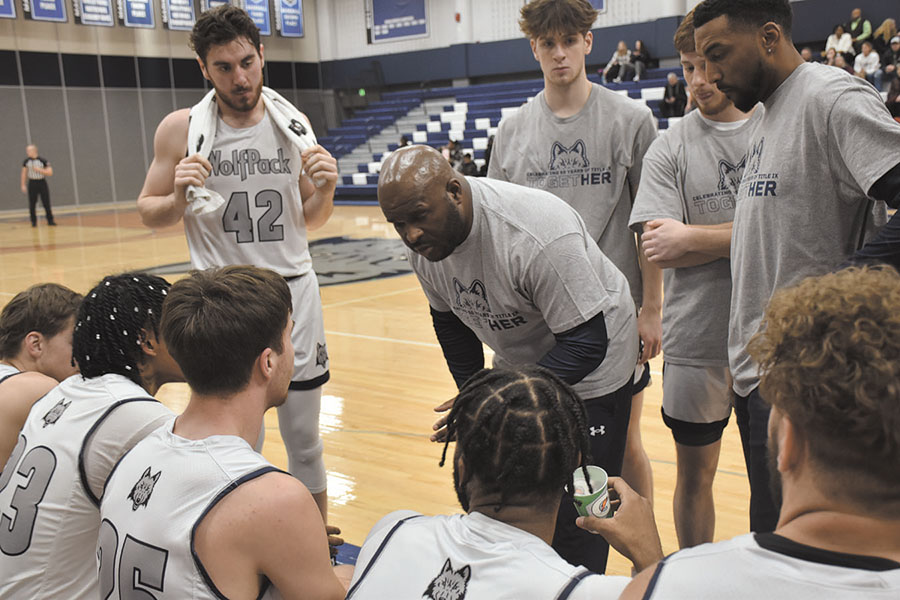WolfPack men’s basketball coach inspires his athletes
Jason Roscoe pushes his players to give their best every time
Madison College men’s basketball coach Jason Roscoe speaks to his team during a timeout during a recent game.
February 15, 2023
Stepping into his first year as the WolfPack men’s head basketball coach, Jason Roscoe knew he was entering into high expectations.
He knew his new role was a calling, and his role wasn’t necessarily on the court.
“I’m a hard coach to play for, and I’m going to require them to be accountable,” Roscoe said.
The requirements continue beyond accountability.
“I require them to give me their best every time. Be a good teammate. Buy in.”
Last week’s basketball game was a come-from-behind thriller. At the end of the first half, the WolfPack were behind by 15 points.
The team rallied into the second half, determined to make up the deficit, thrilling the crowd who never left the stands, even when they were miles behind.
They regrouped, sending Joliet into overtime and securing a win, 85-77.
Clearly, they are working together.
“Teamwork— it is the biggest thing. We’re always finding each other,” said forward/guard Nik Feller. “We’re always making the extra pass. Helping each other out. That’s what always brings us together.”
It doesn’t hurt that the team has a coach who’s on a mission. Asked to describe Roscoe, Feller’s face lights up.
“He loves to win. He’s a winner. He will do whatever it takes to win. We bought into the system, and it’s paid off, Feller said. The “system.”
It’s what drives Roscoe. However, the system doesn’t always play out on the basketball court. A huge factor of his approach is off the court—most of it.
A former Division II three-sport athlete, Roscoe knows the challenges student-athletes face. Entering his first season, he was prepared to share his own college experiences, guiding his team through a challenging season.
The head coach credits his former college academic advisor with providing discipline.
Because Roscoe can share his college experiences and challenges, his athletes can relate to him.
“He pushes us to be our best and play to our strengths. He helps us and stays late after practice and helps us to get better. That’s just who he is. He wants the best for us,” Feller said.
Inspired by his college advisor, Roscoe eventually became one, part of a dual role he carries out at Madison College. He said he loves being an advisor and the personal interaction with students and student-athletes.
Time Management and Soft Skills
As an academic advisor, Roscoe teaches time management skills, such as the nuts and bolts of productiveness, like visually mapping out where time is being spent.
He tells his student-athletes to think of their days as 24 hours, keeping in mind there are 168 hours a week. He encourages the team to consider where their time is going and proactively make decisions from there.
However, Roscoe points out that life and soft skills should be considered.
“Being a student-athlete also consists of being a well-rounded student and being engaged in different student organizations or community service,” said Roscoe, who has 18 years of experience in basketball, including four seasons at the collegiate level.
“Developing a lot of those life skills and soft skills that people don’t always seem to understand the importance of.”
Roscoe is proud to participate in an athletic department that plays a significant role in guiding athletes.
Freshman and first-year transfers need to fulfill four hours of mandatory study hall.
The players must maintain a 3.20-grade point average, and if a student’s GPA dips below, they are assigned to the study hall.
Roscoe says he’s grateful for the investment that the athletic department and folks within the department have made.
Finding Pieces to the Puzzle
The team-building puzzle pieces also look beyond the season and into recruiting.
He’s looking for academically sound students. By “sound,” Roscoe does not require a 4.00 grade point average since he understands the rigors of academics.
However, he needs to know if a recruit is attending classes and using available resources. Having a high basketball I.Q. never hurts. Finally, they must be coachable.
“I’m going to require them to ‘Give up the me for the we.’ I believe when we do that, we’re in the position to win championships,” said Roscoe
For Roscoe, it’s bigger than the game of basketball at the end of the day.
“When (the players) leave this program, I want them looked at as good people. I want them to become great fathers, great husbands and great citizens of their respective communities. I want to do what I can to lead them in the right direction.”































